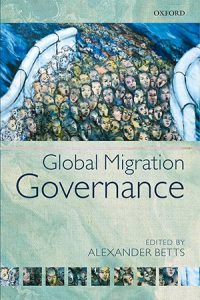Global Migration Governance

Editor: Alexander Betts
Publisher: Oxford University Press
Year of Publication: 2011
Print Length: 368 pages
Genre: Non-Fiction / Political Science, International Relations, Migration & Refugee Studies
Topic: Root Causes, System, Migration, Refugees & Forced Migration, Asylum & Asylum Seekers, Internally Displaced Person (IDP), Asylum & Refugee System, Diaspora, Governance, Management, Smuggling & Human Trafficking, Internationalism, International Cooperation, International Institutions, United Nations, Globalization, Immigration Control, Immigration System, Local & Global, Mobility & Immobility, Financial & Social Remittances, Lifestyle
Unlike many other trans-boundary policy areas, international migration lacks coherent global governance. There is no UN migration organization and states have signed relatively few multilateral treaties on migration. Instead, sovereign states generally decide their own immigration policies. However, given the growing politicization of migration and the recognition that states cannot always address migration in isolation from one another, a debate has emerged about what type of international institutions and cooperation are required to meet the challenges of international migration. Until now, though, that emerging debate on global migration governance has lacked a clear analytical understanding of what global migration governance actually is, the politics underlying it, and the basis on which we can make claims about what ‘better’ migration governance might look like.
In order to address this gap, the book brings together a group of the world’s leading experts on migration to consider the global governance of different aspects of migration. The chapters offer an accessible introduction to the global governance of low-skilled labour migration, high-skilled labour migration, irregular migration, lifestyle migration, international travel, refugees, internally displaced persons, human trafficking and smuggling, diaspora, remittances, and root causes. Each of the chapters explores the three same broad questions: What, institutionally, is the global governance of migration in that area? Why, politically, does that type of governance exist? How, normatively, can we ground claims about the type of global governance that should exist in that area? Collectively, the chapters enhance our understanding of the international politics of migration and set out a vision for international cooperation on migration.
Table of Contents
Acknowledgements
List of Figures
List of Tables
List of Abbreviations
About the Contributors
Introduction: Global Migration Governance — Alexander Betts
1. Low-Skilled Labour Migration — Christiane Kuptsch and Philip Martin
2. High-Skilled Labour Migration — Alexander Betts and Lucie Cerna
3. Irregular Migration — Franck Düvell
4. International Travel — Rey Koslowski
5. Lifestyle Migration — Caroline Oliver
6. Environmental Migration — Jane McAdam
7. UNHCR and the Global Governance of Refugees — Gil Loescher and James Milner
8. Internally Displaced Persons — Khalid Koser
9. Human Trafficking and Smuggling — Susan Martin and Amber Callaway
10. Remittances — Anna Lindley
11. Diasporas — Alan Gamlen
12. Root Causes — Stephen Castles and Nicholas Van Hear
Conclusion — Alexander Betts
Index

Alexander Betts is Professor of Forced Migration and International Affairs, William Golding Senior Fellow in Politics at Brasenose College, University of Oxford. His research focuses on the political economy of refugee protection. He is particularly interested in refugees’ access to socio-economic rights and opportunities, and he has undertaken research across Africa and Europe, and also works on broader themes relating to the politics of migration and humanitarianism. He is author of 12 books and around 100 scholarly publications. His most recent book is The Wealth of Refugees: How Displaced People Can Build Economies (Oxford University Press, 2021), which was awarded the International Studies Association’s ‘Ethnicity, Nationalism, and Migration’ section Distinguished Book Award for 2022. His other books include Refuge: Transforming a Broken Refugee System (Penguin Allen Lane, 2017 with Paul Collier), which was named by the Economist among the ‘best books of 2017’ and The Global Governed? Refugees as Providers of Social Protection (Cambridge University Press, 2020, with Kate Pincock and Evan Easton-Calabria). He leads the IKEA Foundation-funded Refugee Economies Programme, which undertakes participatory research on the economic lives of refugees in Uganda, Kenya, and Ethiopia, and has created one of the first multi-country data sets focusing on the economic lives of refugees and host communities.
Source: https://www.rsc.ox.ac.uk/people/alexander-betts
More from Alexander Betts in this library, click here.
